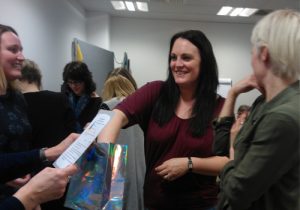How many senses? by Joanna Grace
11th May 2017
Share this entry:

At The Sensory Projects we run to seven senses.
Seven senses? Really?
We thought there were five!
Understanding some of the secret senses can boost your understanding of the children in your care and help you find new ways to support them.
We have five conscious senses: our visual, auditory, gustatory, olfactory and tactile senses. We also have a multitude of subconscious senses which are equally important to our ability to take in information about our world and understand our place within it. Radio four recently did a short series called The Uncommon Senses that looked in an entertaining way at some of these subconscious senses, it is worth a listen.
The current count stands at 33 sensory systems according to ur knowledge from neuroscience. At The Sensory Projects I’m often sorely tempted to stretch to 8 or 9 but for now, in a self-disciplined way, the two subconscious senses I choose to include are our vestibular and proprioceptive senses.
Understanding the subconscious senses better can help you to interpret seemingly odd behaviour in the children you care for and help you to know what to do to support them. All of our senses fluctuate in their ability throughout our day and our life depending on a variety of factors including tiredness, illness and age. And all of our senses can be impaired; just as people can have an impairment of vision so can they have an impairment of their proprioception or vestibulation. But what do these subconscious senses do?
Your vestibular sense is your sense of motion and balance. If I somehow magically picked up the room you are in, and put it on the back of a truck and started driving at high
speed, even though everything you were seeing, hearing, touching, smelling and tasting would remain the same you would still know you were moving. It would be your vestibular sense that gave you that information.
People with impaired vestibulation can struggle to balance, they can feel queasy, seasick on land, and it can be very frightening as what their body tells them is happening does not match up with what appears to be happening, just like as it would for you in the scenario I described above.
Your proprioceptive sense is your sense of where your body is in space. When you reach to pick something up without looking it is your proprioceptive sense that you use, it pairs up your knowledge of where the object is with your knowledge of where your body is in space in a functional way.
People with impaired proprioception will often appear very unsettled, not being able to feel (to sense) where your body is can feel like falling or it not being there at all, which is very frightening. People will fidget to find out where they are.
What can you do to support the development of these senses and to support people who are experiencing difficulties with these senses?
- Give lots of opportunities to practice using the senses, this is easy to do through movement, try to include all types of movement, balancing, spinning, leaping, rolling. Pushing or pulling is also super as it provides pressure through the joints where vital sensory receptors are located.
- Give information usually supplied by these senses through other sensory channels. So, for example, the person struggling with their proprioception who feels like they are falling will feel unnerved, frightened and find it hard to concentrate. If you can give them tactile information about where their body is in space you take away all the nastiness to that lack of proprioception and enable them to connect and concentrate again. You can do this by wrapping them safely in a blanket, giving them something heavy to hold on their laps, placing them by a fan or in a breeze; all of these things give tactile information about their body’s location in space.
Our senses develop through life; some of the children in your care may still be developing their sensory abilities and so will stand to benefit particularly from opportunities to exercise their new sensory skills.
If you would like to find out more about what is likely to engage a child in early sensory development book onto a Develop your sensory lexiconary course or read Sensory-being for Sensory Beings (due for publication by Routledge on the 6th of September).
For more information about The Sensory Projects please visit Joanna’s website.
Click here to register for your free tickets to attend Childcare Expo Manchester on 16th & 17th June 2017.
Why attend Childcare Expo?
Join over 2,500 like-minded individuals from the early years sector who are dedicated to improving both practice and their childcare settings.
Attend educational seminars to credit your CPD
Meet the experts to have your questions answered
Receive fantastic onsite offers and discounts
Experience expert-led informative hands-on workshops
Network with peers and industry players
Pick up hundreds of new product ideas and services
And most of all, enjoy a great day out with your colleagues




